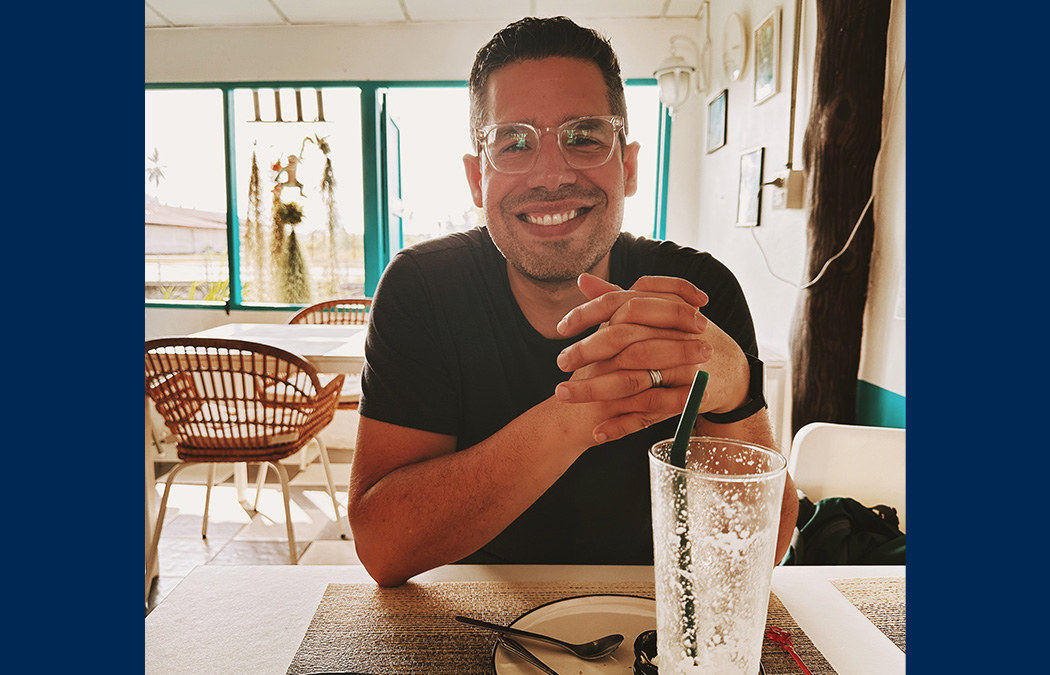Danny Gutierrez, who will earn an M.A. from Saint Mary’s in 2025, describes what he and his family has gone through as a “lifequake.”
Gutierrez had been doing a variety of church mission work in Peru for a decade — including helping at-risk youth and distributing free wheelchairs to those in need.
When COVID-19 hit, they found themselves stranded in the country with the highest mortality rate and the tightest quarantine lockdowns. Throughout the pandemic, the country closed its borders.
The Gutierrez family found an airport that opened briefly, allowing them to visit family in the U.S. for Christmas. Suddenly, and devastatingly, Peru again went into lockdown, the family lost its VISAs, and they were forced to relocate back to the U.S. — leaving behind their home, their jobs, and all of their belongings. Their youngest child had just graduated from high school.
“We started over with nothing,” Gutierrez said. “Out of grief and sorrow and feeling like COVID refugees, we thought, ‘There’s hope in this, and there’s professional life after COVID.’ Who gets that opportunity to clean the slate and be what they want to be with a new life? I knew I could be of service and help here in the U.S. in a different way than internationally.’ ”
It was during this lifequake, Gutierrez said, that Saint Mary’s University came into the picture. As the door on his past closed, Saint Mary’s helped to open a window on a new and meaningful life.
Gutierrez admits he was intimidated to return to school. “The last time I was in higher education was the last millennia,” he said. “I finished my undergrad degree in 1999, so the thought of entering a master’s level program was intimidating at first. A lot had changed since I last printed up a paper in the school computer lab and turned the physical copy in for grading.
He found the Master of Arts in Marriage and Family Therapy program, and he appreciated the fact that Saint Mary’s costs were significantly lower than other programs he investigated.
“I was looking for a program that would be in-person, and when I heard about their cohort model I knew it would be a great fit for me,” he said.
Gutierrez said he appreciated the fact his cohorts were diverse in ages, cultural backgrounds and belief systems. “I would include them among my professors,” he said. “They don’t have a contract and aren’t getting paid but I’ve learned so much from them. I’m grateful once we graduate and enter the field to have these people that I trust, and who know me, who I can lean on for consultation for ideas and encouragement.”
He also speaks highly of the professors, using terms like “thoughtful, helpful, and compassionate” to describe them.
Gutierrez currently works for Change, Inc., a nonprofit organization that does many things, among them, school-based mental health services in over 44 schools in the Twin Cities. Gutierrez works out of Las Estrellas in North East Minneapolis, where he works as a mental health practitioner with elementary-aged youth, assisting new arrivals with therapy in Spanish. He’s also the site lead for the program.
He found it helpful that what he was learning in his courses was “absolutely” applicable to his work. “The core Marriage and Family Therapy theoretical frameworks we are taught, those come into play every day that I see clients,” he said. “I think a lot about our ethics course, our advanced applications, and what I’ve learned every time I’m diagnosing and making treatment plans.”
Once he graduates in June, he plans to get his license and would like to be fully involved in the profession.
“I originally thought I wanted to open a private practice,” he said. “But more and more, the time I spend here at the school, I’m open to working with an organization doing school-based mental health.”
Gutierrez calls his experience at Saint Mary’s “Brutiful.”
“At times it was brutal, but it was always beautiful,” he said. “The classes you could feel the stretch in were the ones I entered into going, ‘What did I get myself into?’ Like statistics. I didn’t think I could get through it. But it was beautiful to get to the end of it and say, ‘I can do that’ with support from my professor and my cohort, and I really did learn things. There were some weeks that felt brutal, but coming out of them, I was so glad I had that experience, and was so glad there were people to walk with me through it. If a person is looking to grow and all that that implies toward becoming a healthier human being, I would recommend Saint Mary’s. It’s not a cakewalk. It’s work. But I would say it’s worth it. It has been for me.”
